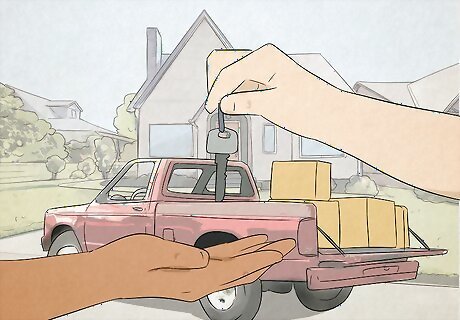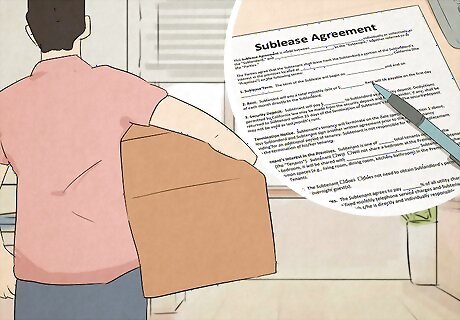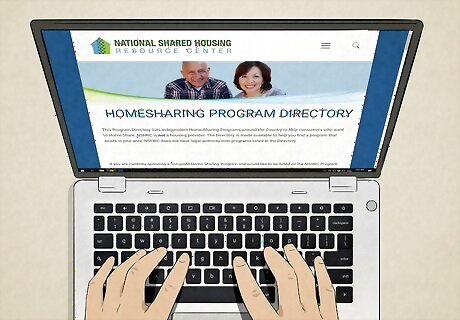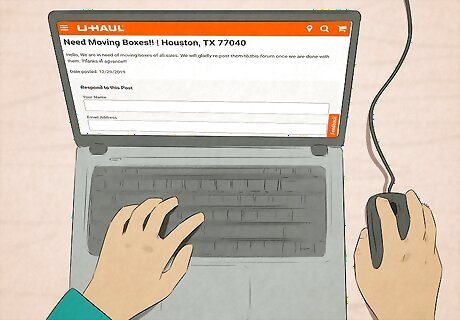
views
Relocate to a town with a low cost of living.

A low-cost town can take a lot of financial stress off your shoulders. States like Indiana, West Virginia, Arkansas, Missouri, and Alabama are a lot more affordable than other parts of the country. Plus, towns like Cedar Park, Texas; Ogden, Utah; Raleigh, North Carolina; Midland, Texas; and Provo, Utah are especially budget-friendly. Here are a few other cheap towns and cities you could consider: Minneapolis, Minnesota St. Paul, Minnesota Winchester, Virginia Des Moines, Iowa
Apply for a driveaway company.

Certain companies will pay you to drive a vehicle one-way to a new location. Car renting road trippers often take one-way trips with their vehicles, leaving them pretty far from their place of origin. Driveaway companies hire people to drive these cars on a one-way trip back to their original location. This could be a great way to get to a new place, all while making some money in the process. Auto Driveaway is the most well-known driveaway company out there, but you can also find open driveaway jobs on most job hunting sites.
Move to a place with a relocation initiative.

Some areas will pay you thousands of dollars to move there. The state of West Virginia pays interested newcomers $12,000 to live there for 2 years, with prepaid outdoor activities like downhill skiing and whitewater rafting included in the package. Places like Tulsa, Oklahoma and Topeka, Kansas are also willing to pay thousands of dollars to new residents who move there. Here’s a closer look at some of your options: Northwest Arkansas: $10,000 to each person who moves there Vermont: $7,500 for remote workers to relocate Topeka, Kansas: $15,000 in housing support to new residents Tulsa, Oklahoma: $10,000 for remote workers to relocate
Borrow a friend’s car.

Cut costs on a moving van with free or cheap transportation. Ask your friend if you can use their car to move your belongings over to your new place—the bigger the car, the better! See if they’ll let you use their car for free, or offer to pay for gas. Try chatting up your friends who have an SUV or pick-up truck first. The bigger their car is, the fewer trips you’ll have to make. Erin Lowry Erin Lowry, Personal Finance Expert When facing a move with limited funds, resist racking up credit card debt for temporary conveniences. Instead, get creative—leverage your network for rideshares, temporary housing, borrowing a truck or supplies, and earning extra 'gig economy' income. Moving frugally requires grit and sacrifice, but with resourcefulness and strict budgeting, you can transition to a new lower cost area and lifestyle aligned to your long-term goals.
Move with a friend.

Having a roommate is a great way to save money. You’ll still need to pay rent, but your original costs are split in half (or by however many roomies you get on board). Look for a place where the rent is already reasonable, so you pay even less per month. The median rent in America is a little less than $1,100. If you were splitting that cost with a friend, you’d pay less than $550 each month!
Lease a sublet.

Sublets let you piggy-back on someone else’s rental contract for a set amount of time. Renters and home-owners sublet their homes when they’re away for a long period of time—this way, they won’t lose their home while they’re away. Sublet contracts can last for weeks and months at a time, and can be a great solution if you’re looking for a quick, cheap way to move out. Airbnb has a section of their site dedicated to subletting: https://www.airbnb.com/sublets. In fact, plenty of hosts offer discounts to renters who book a room for at least 28 days. Subleases come in 2 forms: short-term and long-term. With a short-term sublease, the original renter plans on coming back—you’re just staying there until that time comes. With long-term subleases, however, the renter doesn’t plan on coming back. So, you stay in the room or space until the lease runs out.
Couch surf at someone else’s place.

Couch surfing is a good short-term option if you really need to leave your old place. The Couchsurfing app lets you browse available hosts (or “couches”) in the area where you can crash for the night. Couch surfing at someone’s place is completely free—just keep in mind that service is targeted toward travelers and tourists, and isn’t a viable long-term moving solution. The official Couchsurfing company recommends doing some sort of nice gesture for your host in return for your lodging, like offering to make dinner.
Stay at a hostel temporarily.

Hostels offer cheap housing if you need a short-term place to stay and don’t mind crowds. The cheapest hostel rooms are designed to fit small groups of people, and may not be ideal if you like peace and quiet. Still, some hostels let you pay for your lodging for a week at a time, which is definitely helpful if you need a new place to stay. Sites like Hostel World and Hostelling International USA can help you find hostels in your area.
Join a home-sharing arrangement.

Home-sharing lets you live in someone’s home for low or waived rent. This kind of set-up typically pairs elderly homeowners in need of a little extra assistance with younger individuals looking for discounted (or free) rent. In exchange for a little extra help and/or companionship, you can live in someone else’s home for almost nothing. Check out this directory to find home-sharing opportunities in your state: https://nationalsharedhousing.org/program-directory/
Sell your unwanted belongings.

Turn your unwanted items into cash for your move. Sort through your belongings and decide what you do and don’t want to keep. Sell any valuable, unwanted items online or host a yard sale in your neighborhood to help with your downsizing efforts. There’s no point in packing and moving things that you don’t want or need! Feel free to donate some of your old clothes if you don’t feel like selling them.
Get free moving boxes.

Stores, strangers, and offices all have unwanted boxes you can use. Stop by your local liquor store, bookstore, and grocery store first—these shops have plenty of boxes to spare. Coffee shops, fast food joints, and schools are also great places to check. Spread the word on sites like Craigslist and Freecycle, too. Chances are, there’s someone in your area with some boxes that they don’t need. The U-Haul company manages a “box exchange” web forum dedicated to helping people find and distribute their unused boxes. Ask your friends and loved ones for help, too! They might have some leftover boxes that they don’t need.
Set up a fundraising page for the move.

Crowdfunding can be very effective if your campaign gets enough money. There’s nothing wrong with asking for help from friends, neighbors, acquaintances, and even perfect strangers, especially if you’re trying to escape a dangerous living situation. Explain what your story is on the campaign page, and let potential donors know that any and all contributions are greatly appreciated. Sites like GoFundMe, GoGetFunding, FundRazr, Plumfund, and Fundly are all good options to consider.
Ask friends and loved ones for money.

Create a detailed repayment plan so they’re more likely to support you. There’s no easy way to ask a friend or relative for money, but a repayment plan shows that you fully intend to pay them back. Draft up a loan agreement explaining how much money you need, how much and how often you plan on repaying the loan, and how much interest you’ll pay. To help convince your friend or loved one further, explain what consequences you’ll face if you don’t pay them back in time. Making a loan agreement definitely requires a little extra work, but it will also show how serious you are about what you’re asking. When first bringing up the loan in conversation, say something like, “I’d really like to move out and have a place of my own, but I’ve hit a rough patch financially. Would I be able to borrow $1,500 to help get me on my feet? I plan on paying it all back over the next 6 months with 3% interest.”
Look for job opportunities in your new town.

Landing a job before the move can offer some financial peace of mind. Once you’ve settled on where you’re moving to, start searching online for jobs in that area. Having a job lined up makes it much easier to manage any new bills and expenses after you move, and gives you one less thing to worry about in the weeks or months to come. Gig work, like driving for Uber or Lyft, is a great way to make some quick cash, especially if you live in a busy area.
Adjust your budget after the move.

Give yourself time to save money and adjust to your new setup. Adjusting to a smaller budget prevents you from living beyond your means, along with any unnecessary financial stress. Experts suggest using a 50/30/20 guideline to manage your monthly paychecks. This involves putting: 50% of your monthly pay toward necessary expenses 30% of your monthly pay toward things you want 20% of your monthly pay toward debt repayment and long-term savings
Create a backup plan.

Know what you’ll do and where you’ll stay if your housing falls through. Talk with your trusted friends and loved ones to see if you can come up with a contingency plan in case you lose your housing or don’t have enough money to make ends meet. Knowing that you can crash at a friend’s place can offer some peace of mind as you transition through your move. If you do lose your home, the government might be able to help. Check out this directory of homelessness assistance programs by state: https://www.hud.gov/topics/homelessness/localassist


















Comments
0 comment